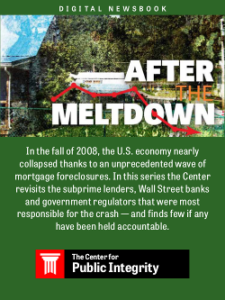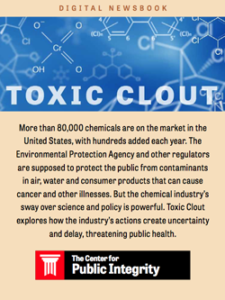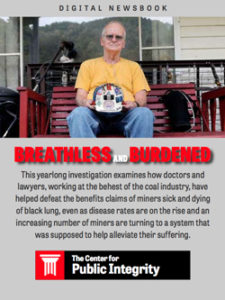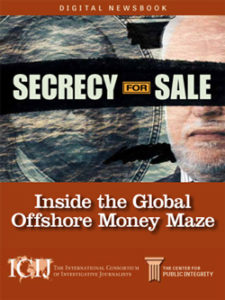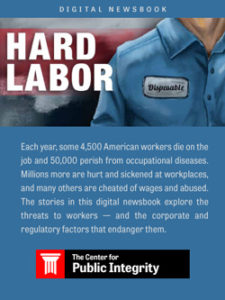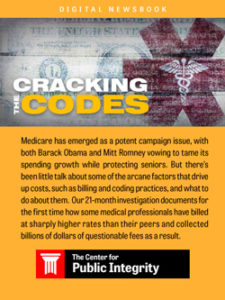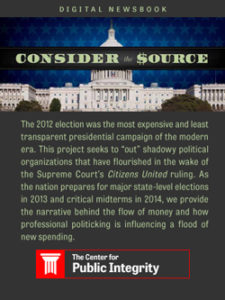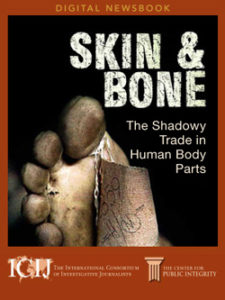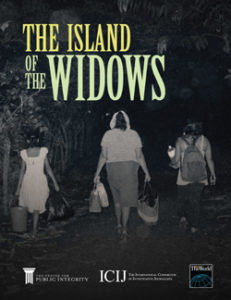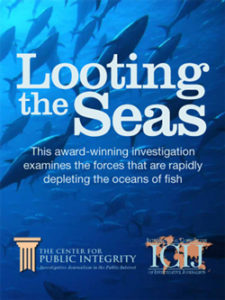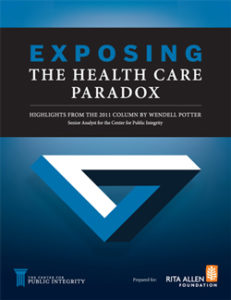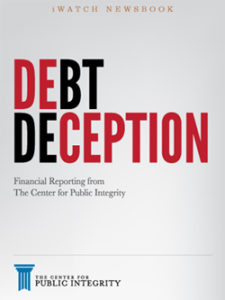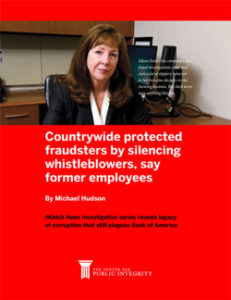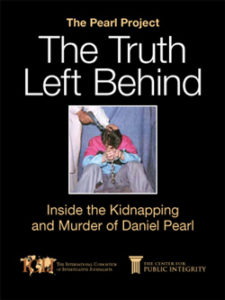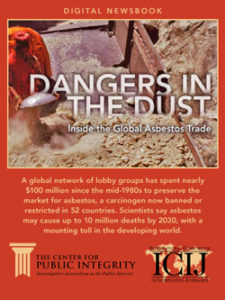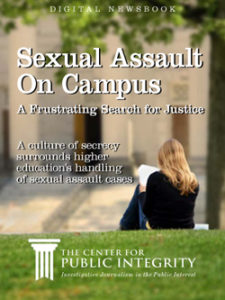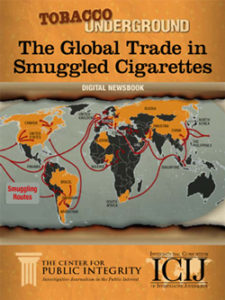Books and archived reports
Click one of the e-books below to view the investigations. The e-books are compatible with most tablet e-reader software.
After the Meltdown
In the fall of 2008, the U.S. economy nearly collapsed thanks to an unprecedented wave of mortgage foreclosures. In this series the Center revisits the subprime lenders, Wall Street banks and government regulators that were most responsible for the crash — and finds few if any have been held accountable.
Toxic Clout
More than 80,000 chemicals are on the market in the United States, with hundreds added each year. The Environmental Protection Agency and other regulators are supposed to protect the public from contaminants in air, water and consumer products that can cause cancer and other illnesses. But the chemical industry’s sway over science and policy is powerful. Toxic Clout explores how the industry’s actions create uncertainty and delay, threatening public health.
Breathless and Burdened
This yearlong investigation examines how doctors and lawyers, working at the behest of the coal industry, have helped defeat the benefits claims of miners sick and dying of black lung, even as disease rates are on the rise and an increasing number of miners are turning to a system that was supposed to help alleviate their suffering.
Mystery in the Fields
A rare form of kidney disease is killing laborers and crippling communities in three different regions, from Central America to Sri Lanka to India. As death tolls mount, researchers remain puzzled, unable to definitively uncover the disease’s causes.
Secrecy for Sale
Dozens of journalists sifted through millions of leaked records and thousands of names to produce ICIJ’s investigation into offshore secrecy.
Hard Labor
Each year, some 4,500 American workers die on the job and 50,000 perish from occupational diseases. Millions more are hurt and sickened at workplaces, and many others are cheated of wages and abused. The stories in this digital newsbook explore the threats to workers — and the corporate and regulatory factors that endanger them.
Cracking the Codes
Medicare has emerged as a potent campaign issue, with both Barack Obama and Mitt Romney vowing to tame its spending growth while protecting seniors. But there’s been little talk about some of the arcane factors that drive up costs, such as billing and coding practices, and what to do about them. Our 21-month investigation documents for the first time how some medical professionals have billed at sharply higher rates than their peers and collected billions of dollars of questionable fees as a result.
Consider the Source
The 2012 election was the most expensive and least transparent presidential campaign of the modern era. This project seeks to “out” shadowy political organizations that have flourished in the wake of the Supreme Court’s Citizens United ruling. As the nation prepares for major state-level elections in 2013 and critical midterms in 2014, we provide the narrative behind the flow of money and how professional politicking is influencing a flood of new spending.
Skin & Bone
ICIJ found the business of recycling dead humans has grown so large over the past decade that you can buy stock in publicly traded companies that rely on corpses for their raw materials.
The Island of the Widows
Thousands of men working in the Pacific Coast sugarcane fields of El Salvador, Nicaragua, Costa Rica and neighboring countries have been dying of chronic kidney disease, an ailment that in most parts of the developed world is a manageable condition. The condition has been exacerbated by difficult working conditions and poor access to timely health care, while Central American governments and the sugar industry have done little in response.
Looting of the Seas
This award-winning investigation examines the forces that are rapidly depleting the oceans of fish.
Exposing the Health Care Paradox
Highlights from the 2011 column by Wendell Potter.
Debt Deception
This investigative series revealed the legacy of corruption that plagued Bank of America.
The next part of the investigative series, which revealed the legacy of corruption that plagued Bank of America.
The Truth Left Behind
The case is a window into several se-rious issues that have rel-evance today to U.S. foreign policy and America’s war in Afghanistan: the emergence of a “Punjabi Tali-ban,” made up of militants from the Pakistani province of Punjab; the role of Karachi, Pakistan’s largest city, as a safe haven for militants; and the nexus between the Paki-stani militancy and Al Qaeda. The case also offers important lessons related to problems with rule of law in Pakistan.
Dangers in the Dust
A global network of lobby groups has spent nearly $100 million since the mid-1980s to preserve the market for asbestos, a carcinogen now banned or restricted in 52 countries. Scientists say asbestos may cause up to 10 million deaths by 2030, with a mounting toll in the developing world.
Sexual Assault on Campus
A culture of secrecy surrounds higher education’s handling of sexual assault cases.
Who’s Behind the Financial Meltdown?
The top 25 subprime lenders and their Wall Street backers.
Tobacco Undergound
Tobacco Underground is a project of the International Consortium of Investigative Journalists. Working with reporters in more than a dozen countries, ICIJ is charting the frontlines of the illicit traffic in cigarettes.
Most of the above e-books were produced in collaboration with the Reynolds Journalism Institute at the Missouri School of Journalism. More information about the RJI Digital Newsbook Project can be found at: http://www.rjionline.org/newsbooks
The following books from the Center for Public Integrity are available in print.
City Adrift: New Orleans Before and After Katrina (2007)
In the wake of Hurricane Katrina, seven seasoned journalists traveled to New Orleans to investigate the storm’s aftermath. Through interviews with homeowners, first responders, politicians, evacuees, and ordinary citizens, the team explored the storm from every angle, including health care, social services, housing and insurance, and emergency preparedness. This comprehensive collection of expert voices uniquely details not only what went wrong in the Big Easy, but provides a road map to avoiding disaster in the future. This book is about more than just the mishandling of Katrina’s aftermath — it’s about how unprepared the government still is for the next disaster.
Networks of Influence: The Political Power of the Communications Industry (2005)
Who owns the media in your town? How much do you know about the political agendas of the giant broadcasting, cable TV, and telephone companies that you rely on for news and information? To find the answers to these questions and more, read this in-depth resource about the broadcasting and telecommunications industries. Networks is a must-read for anyone who wants to “consider the source” of virtually all the news and information they consume every day. Written by the staff of the Center for Public Integrity, the book contains financial and political profiles of the top 41 communications conglomerates in the United States, in addition to detailed contribution information about the congressional committee members that oversee the industry.
The Corruption Notebooks: 25 Investigative Journalists Report on Abuses of Power in Their Home Country (2004)
The Corruption Notebooks is a hard-hitting collection of essays by leading investigative journalists from around the world on what happens when the public is either uninformed about abuses of power or incapable of doing anything about it. Many of the 25 contributing journalists have been threatened, jailed, and in some cases had their offices firebombed. All have spent years fearlessly uncovering government and corporate scandal in their home countries. Their unique and comprehensive essays reveal how no democracy, including the United States, is immune from the scourge of corruption. Published by the Center for Public Integrity, The Corruption Notebooks is essential for anyone seeking to understand the insidious impact of corruption on societies around the world.
Harmful Error: Investigating America’s Local Prosecutors (2003)
Harmful Error is the first-ever national examination of local prosecutors’ conduct in all types of criminal proceedings. The book reveals how local prosecutors in jurisdictions across the nation have stretched, bent, or broken rules to win convictions. Pulitzer Prize-winning journalist Anthony Lewis applauded the book as “by far the best thing I have ever seen on or near the subject of prosecutorial misconduct. It is painful but essential reading.” Since 1970, individual judges and appellate court panels have cited prosecutorial misconduct as a factor when dismissing charges, reversing convictions, or reducing sentences in more than 2,000 cases. In thousands more, judges labeled prosecutorial behavior inappropriate, but upheld convictions using a doctrine called “harmless error.” The book shows how prosecutors’ misconduct led not only to the conviction of innocent individuals who were later exonerated, but also resulted in guilty defendants having their convictions overturned and being placed back on the street. Many of these prosecutors were cited multiple times for their misconduct. These prosecutors give recidivism — a word usually used to describe those they work to put behind bars — a disturbing new meaning.
The Buying of the President 2004: Who’s Really Bankrolling Bush and His Democratic Challengers – and What They Expect in Return (2004)
A New York Times bestseller, The Buying of the President 2004 reveals how the process of choosing a president has moved from the voting booth to the auction block, and shines a light on the special interests that heavily invest in the politicians who seek the nation’s highest office. Lewis and his team reveal and investigate the sponsors and the known and not-so-known conflicts of interest entangling each of the aspirants to the White House. This is the only book of its kind, containing investigative profiles and personal histories of the major presidential candidates.
The Water Barons: How a Few Powerful Companies Are Privatizing Your Water (2003)
The privatization of public water systems around the world, driven by a handful of European corporations and the World Bank, is increasing dramatically despite sometimes tragic results. The Water Barons, by the International Consortium of Investigative Journalists, a project of the Center for Public Integrity, shows how the three largest water utility companies have expanded since 1990 into nearly every region of the world, raising concerns that a handful of private companies could soon control a large chunk of the world’s most vital resource.
Making a Killing: The Business of War (2003)
Amid the global military downsizing and the growth of small conflicts since the end of the Cold War, governments have turned increasingly to private military companies to intervene on their behalf around the globe. Making a Killing, by the International Consortium of Investigative Journalists, a project of the Center for Public Integrity, looks at over 90 companies now providing services normally performed by national military forces. These companies have operated in 110 countries worldwide. They provide everything from military training to logistics, and even engage in armed combat — and they have virtually no public oversight.
Capitol Offenders: How Private Interests Govern Our States (2002)
A scourge of legalized corruption is spreading through state capitols across the country. With little fear of exposure, vested interests have turned one statehouse after another into private preserves for their agendas, imperiling our health and safety, our wallets, our environment, and our rights as citizens in the process. Capitol Offenders, by Diane Renzulli and the Center for Public Integrity, is the first investigative book to expose the close ties between state lawmakers and large industries, documenting the fusion of public service and private interests.
The Cheating of America: How Tax Avoidance and Evasion by the Super Rich Are Costing the Country Billions — and What You Can Do About It (2001)
Each year, millions of income-earning adults and corporations do not pay their fair share of federal income taxes — whether legally (tax avoidance), illegally (tax evasion), or through shady means (tax “avoision”), and their numbers are rising dramatically. In this explosive book, Charles Lewis, founder of the Center for Public Integrity, and Bill Allison, a former researcher at the Philadelphia Inquirer, expose the worst of these white-collar culprits and explain how they can be stopped.
Citizen Muckraking: How to Investigate and Right Wrongs in Your Community (2000)
Published by Common Courage Press, this book is a hands-on, practical guide to being an effective muckraker, detailing methods used by investigative reporters to uncover and address the ethical lapses of corporate and government groups that affect even small communities. The narrative also includes case histories in which one person or community illuminated the damaging truths behind corrupt powerbrokers, with inspiring results.
The Buying of the President 2000 (2000)
Twenty-four researchers, writers, and editors worked for 18 months to page through tens of thousands of federal and state records, thousands of news articles, and hundreds of interviews to create this definitive book. It is the only investigative book about the 2000 presidential candidates.
Animal Underworld: Inside America’s Black Market For Rare And Exotic Species (1999)
Written by Alan Green and the Center for Public Integrity, and published by Public Affairs, this book collects four years of unprecedented research into the exotic animal trade in the United States and exposes the underground trade in rare and endangered animals. Animal Underworld documents how these creatures are moved from respected zoological parks and research institutions through a network of shady, but often federally licensed, dealers to private pet owners, roadside attractions, and even “canned hunts” — and tells you why more is not being done to stop it. Read a preview here.
The Buying of the Congress: How Special Interests Have Stolen Your Right to Life, Liberty, and the Pursuit of Happiness (1998)
The United States Congress is supposed to work for you. So think of this book as the most important employee evaluation you’ll ever read. A startling and groundbreaking expose, The Buying of the Congress details the ways in which special interests worm themselves into the lives of Capitol Hill lawmakers — who in turn protect polluters, cigarette manufacturers, food producers, the airline industry, the insurance industry, corporate tax cheats, and other big-money interests. What does all this have to do with you? You cannot shop at the local supermarket or drugstore, visit a hospital emergency room, watch television, pay your taxes, or even breathe the air outside your home without being directly affected by the decisions that Congress makes — decisions that, increasingly, favor special interests at your expense. Now, Charles Lewis and the Center for Public Integrity reveal just how and why Congress has been so unresponsive to the basic concerns of ordinary citizens. Based on the work of an investigative team of more than three dozen people, the conclusions they reach are simple — and simply frightening.
The Buying of the President (1996)
This guide to the big money sources behind the presidential candidates features hard-hitting facts culled from public records, detailed pie charts, and easily referenced top-ten lists of financial supporters for all the candidates who were part of the 1996 presidential campaign.
Toxic Deception: How the Chemical Industry Manipulates Science, Bends the Law, and Endangers Your Health (1996)
Toxic pollution has increased dramatically in the 37 years since the publication of Rachel Carson’s seminal Silent Spring, and the chemical industry has become infinitely more sophisticated at deploying legions of lobbyists, lawyers, scientists, and public relations experts who camouflage its deadly deceptions. Two prize-winning investigative reporters have dug deep into the secretive world of the nation’s chemical giants and unearthed enough wrongdoing to shake America’s faith in many of the products of our homes. Yet rather than merely exposing the injustices of the chemical industry, Toxic Deception offers an optimistic vision of how consumers can reduce their own risk and how a flawed system of health and safety laws can be rescued through practical reforms.
Beyond the Hill: A Directory of Congress from 1984 to 1993 (1995)
Subtitled “Where Have All the Members Gone?” this book by Rebecca Borders and C.C. Dockery shows the great consideration given by members of Congress on what it means to seek power, to exercise it (or attempt to), and finally to lose it or give it up.
The following reports from the Center for Public Integrity are available in PDF format.
The Fat Cat Hotel (1996)
Where to stay in the nation’s capital? If you’re one of the Democratic Party’s big donors or fund-raisers, your hotel of choice isn’t the Four Seasons or the Ritz-Carlton. It’s the White House.
Crossing Borders, Opening Doors: Selected Articles from the International Consortium of Investigative Journalists (2005)
A collection of 10 investigative reports by journalists from across the globe.
Stealth PACs Revealed: Interest Group Profiles, 2000 Election (2001)
An examination of Section 527 soft money groups and the role they played in the 2000 elections.
Our Private Legislatures: Public Service, Private Gain (2000)
A state-by-state analysis of lawmakers’ conflicts of interest, based on their sources of income and assets, committee assignments, leadership positions, and legislative duties.
Off the Record: What Media Corporations Don’t Tell You About Their Legislative Agendas (2000)
Off the Record reveals that the giant media corporations of today are little different from any other special interest. They make campaign contributions. They lobby. They pay for junkets. And more often than not, they get exactly what they want, which is why the media is widely regarded as the most powerful special interest in Washington.
Nothing Sacred: The Politics of Privacy (1998)
This is the fourth and final “Congress and the People” study. It explores how sensitive financial information and personal data are bought and sold by scores of companies, often without the subjects’ knowledge or permission. Health care records are similarly available to prying eyes. In the workplace, telephone conversations often are monitored. This study investigates how Congress has put big-money corporate interests ahead of the basic privacy rights of the American people. (1998)
Unreasonable Risk: The Politics of Pesticides (1998)
This, the third of the “Congress and the People” studies, explores the potential dangers associated with pesticide use and analyzes why lax regulation of these dangerous products continues to exist. Among other things, the study shows how the pesticide industry is seeking to weaken the Food Quality Protection Act.
In the Unlikely Event…: The Politics of Airline Safety (1998)
The second of the “Congress and the People” studies, this explores the money and perks given by Democrats, Republicans, and members of the FAA and the safety issues that as neglected, as a result.
Safety Last: The Politics of E Coli and Other Food-Borne Killers (1998)
This report is the first of four “Congress and the People” studies. Congress consistently has ignored growing threats to the public health posed by the slaughter and meatpacking industries, meat producers, and distributors. Over the preceding decade, the food industry contributed $41 million to the campaigns of members of Congress, who obliged by blocking every bill that promised meaningful improvement.
Squeeze Play: The United States, Cuba, and the Helms-Burton Act (1997)
This study, written by Patrick J. Kiger and investigated by John Kruger, is an analysis of the forces behind the U.S. economic embargo against Cuba, particularly the Cuban American National Foundation. Findings include the fact that Senator Robert Torricelli, Democrat of New Jersey, completely reversed his position on Cuba after receiving $120,000 from directors and trustees of CANF and the Free Cuba PAC.
Under the Influence: The 1996 Presidential Candidates and Their Campaign Advisers (1996)
This report identifies the paid and unpaid advisors to all the major presidential candidates, from lawyers and lobbyists to spin-doctors and even shadier cohorts. As an outstanding example, the Center discovered that the co-chairman of Pat Buchanan’s campaign, Larry Pratt, taught white suprefmacist groups how to develop militia capabilities. The Associated Press issued an “Urgent” bulletin about this information. Within two hours of the Center’s Washington news conference, reached in New Hampshire by CNN, Buchanan removed Pratt from his campaign. This was the top story in the U.S. for one day.
Place Your Bets: The Gambling Industry and the 1996 Presidential Election (1996)
Written by Meredith O’Brien, this report documents the gambling industry’s extensive ties to the two major political parties and to Bill Clinton and Bob Dole, 1996’s two presidential nominees. Since 1991, gambling interests poured more than $4.5 million into campaigns for the White House and Congress and into the soft-money accounts of the Democratic and Republican Parties.
Sleeping With the Industry: The U.S. Forest Service and Timber Interests (1994)
This study examines the U.S. Forest Service under the Clinton administration and its relationship to Congress and the private sector. Written by Steven T. Taylor, the report is based on extensive field research in Alaska, Colorado, California, and Washington, D.C.
Saving for a Rainy Day II: How Congress Spends Leftover Campaign Cash (1994)
Kevin Chaffee updates a March 1991 study which found that since 1979, 112 former members of Congress used an estimated $10.5 million in unspent campaign donations for non-election-related purposes. This study is based upon Federal Election Commission records of more than 200 members of Congress who left office between 1979 and 1993.
Well-Healed: Inside Lobbying for Health Care Reform (1994)
Researched and written by 17 researchers who examined the Washington lobbying activities of 660 interest groups for over a year, this study is regarded as the only authoritative guide to health care lobbying with regards to the 1993-94 Clinton health care reform legislation.
The Trading Game: Inside Lobbying for North American Trade Agreement (1993)
This study is praised by the Columbia Journalism Review as the definitive investigation into lobbying for and against NAFTA. The Center found that the Mexican government and business interests waged the largest foreign lobbying campaign in the United States, spending at least $30 million to promote the development and enactment of NAFTA. Besides hiring a phalanx of Washington law firms, lobbyists, public relations companies, and consultants, Mexican interests took 83 Congressional staff members on all-expense-paid trips to Mexico.
Biohazard: How the Pentagon’s Biological Warfare Research Program Defeats Its Own Goals (1993)
This Center study, by Seth Shulman, explores the U.S. Army’s Biological Defense Research Program (BDRP) and finds the program misguided in its aims and poorly managed. It deems the problems so extreme as to suggest that the BDRP research may actually undermine efforts to control and protect against the heinous threat of biological warfare.
Toxic Temptation: The Revolving Door, Bureaucratic Inertia and the Disappointment of the EPA Superfund Program (1993)
Eric J. Greenberg’s look at how the Environmental Protection Agency remains a promise unfulfilled, plagued with fraud, political manipulation, influence-peddling, and contractor terrorism
Silence of the Laws: How America’s Leading Defense Companies Employ Women and Minority Executives (1992)
Written by Encarnacion Pyle, this report begins with a 1965 Lyndon Johnson Executive Order requiring federal government contractors to abide by certain “equal opportunity” standards. The Center finds that a quarter century later, an extraordinarily low number of women and minorities – two percent or less -are employed in the upper management ranks of the 20 largest defense contractors.
For Their Eyes Only: How Presidential Appointees Treat Public Documents as Personal Property (1992)
Steve Weinberg investigates the practice in which former U.S. officials take classified documents with them after leaving public service, use the materials to write lucrative memoirs, and then seal off these documents for decades from historians, journalists, and other researchers. The Center finds that former Secretary of Defense Caspar Weinberger locked up 1,700 pages of personal notes at the Library of Congress, sealed away from the public, the General Accounting Office and, at least initially, federal prosecutors.
Private Parties: Political Party Leadership in Washington’s Mercenary Culture (1992)
The Center finds that between 1977 and 1992, half of the national political party chairmen had conflicts of interest, simultaneously receiving fees from corporations, law firms, and other sources. In January 1993, Bob Woodward of The Washington Post reports that Democratic National Committee chairman and Secretary of Commerce-designate Ron Brown was questioned for five hours by FBI agents, who asked “detailed questions based on a highly critical report on political party chairmen by the Center for Public Integrity.”
The Torturers’ Lobby: How Human Rights-Abusing Nations Are Represented in Washington (1992)
Pamela Brogan’s examination of 10 major U.S. foreign aid recipients, all associated with serious human rights abuses, that pay Washington lobbyists to press Congress for increased aid.
Under the Influence: Presidential Candidates and Their Campaign Advisors (1991)
This groundbreaking Center report, published in 1991, disclosed that most of the major presidential candidates were relying heavily on Washington “insiders” to make their way to the White House, despite all their fiery rhetoric against special interests and anti-Washington “populism.”
Buying the American Mind: Japan’s Quest for U.S. Ideas in Science, Economic Policy, and the Schools (1991)
This report, by Stephanie Epstein, finds that taxpayer-supported, high-tech university laboratory research is being sold for a song to Japanese and other non-U.S. corporations.
Saving for a Rainy Day: How Congress Turns Leftover Campaign Cash Into “Golden Parachutes” (1991)
Kevin Chaffee’s March 1991 study which found that since 1979, 73 former members of Congress used an estimated $6.4 million in unspent campaign donations for what were, in most cases, non-election-related purposes. This study is based upon Federal Election Commission records of more than 200 members of Congress who left office between 1979 and 1991.
Under Fire: U.S. Military Restrictions and the Media from Grenada to the Persian Gulf (1991)
This study, by Jacqueline Sharkey, examines the controversies surrounding restrictions on the media during the Gulf War and two major U.S. offensive military operations in the 1980s: the invasions of Grenada and Panama.
Short-Changed: How Congress and Special Interests Benefit at the Expense of the American People (1991)
This Center report, by Jean Cobb, documents a number of cases in which it appears that money was a factor in the way members voted on specific pieces of legislation or amendments. In addition, it illustrates how these votes are hurting taxpayers and consumers through lost revenue and higher prices.
America’s Frontline Trade Officials (1990)
America’s Frontline Trade Officials, the Center’s first study, was released at a National Press Club news conference. The report prompts a Justice Department ruling, a General Accounting Office report, a Congressional hearing, is cited by four presidential candidates in 1992, and is partly responsible for an Executive Order in January 1993 by President Clinton, placing a lifetime ban on foreign lobbying by White House trade officials.
